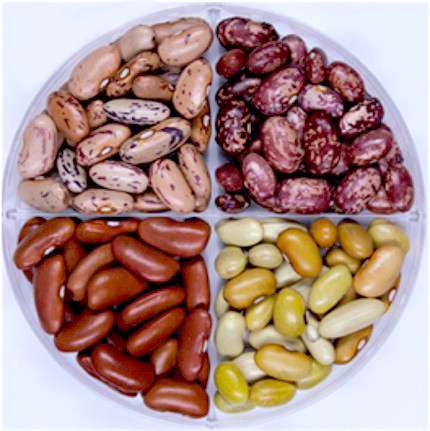Fast-cooking dry beans provide more protein, iron than 'slower' varieties

Beans are a versatile, inexpensive staple that can boost essential nutrients in a diet, especially for people in low-resource areas where food options are limited. To get the most out of these legumes, new research suggests choosing fast-cooking dry beans could be the way to go. A study in ACS' Journal of Agricultural and Food Chemistry found that fast-cooking beans retained more protein, iron and other minerals than "slower" dry beans.
According to the World Health Organization about 2 billion people around the world are estimated to be deficient in key vitamins and minerals, including iron and zinc. Dry beans could help address these deficiencies, but they often take a long time to cook. This can deter people from adding them to meals. To prepare food, many people with limited resources rely on burning wood, charcoal or other biofuels that can require a lot of time to gather or a relatively high percentage of their income. For those reasons, faster-cooking beans would be a good dietary option, but whether they carry the same nutritional value as slower-cooking varieties was unknown. So Karen A. Cichy, from the U.S. Department of Agriculture, and colleagues set out to test them.
The researchers analyzed the nutritional value of 12 fast-, moderate- and slow-cooking dry bean cultivars from four classes: yellow, cranberry, light red kidney and red mottled. The speedier beans maintained higher protein and mineral content after they were prepared than the moderate- and slow-cooking varieties. For example, the fast-cooking yellow bean Cebo Cela contained 20 percent more protein, 10 percent more iron and 10 percent more zinc than the yellow bean Canario, which took twice as long to prepare. Further testing showed that the iron bioavailability—the amount that a person's body would absorb—is also higher in the quicker-cooking beans in each of the four classes examined.
More information: Jason A. Wiesinger et al. Demonstrating a Nutritional Advantage to the Fast-Cooking Dry Bean (L.), Journal of Agricultural and Food Chemistry (2016). DOI: 10.1021/acs.jafc.6b03100
Abstract
Dry beans (Phaseolus vulgaris L.) are a nutrient-dense food rich in protein and micronutrients. Despite their nutritional benefits, long cooking times limit the consumption of dry beans worldwide, especially in nations where fuelwood for cooking is often expensive or scarce. This study evaluated the nutritive value of 12 dry edible bean lines that vary for cooking time (20–89 min) from four market classes (yellow, cranberry, light red kidney, and red mottled) of economic importance in bean-consuming regions of Africa and the Americas. When compared to their slower cooking counterparts within each market class, fast-cooking dry beans retain more protein and minerals while maintaining similar starch and fiber densities when fully cooked. For example, some of the highest protein and mineral retention values were measured in the fast-cooking yellow bean cultivar Cebo Cela, which offered 20% more protein, 10% more iron, and 10% more zinc with each serving when compared with Canario, a slow-cooking yellow bean that requires twice the cooking time to become palatable. A Caco-2 cell culture model also revealed the bioavailability of iron is significantly higher in faster cooking entries (r = −0.537, P = 0.009) as compared to slower cooking entries in the same market class. These findings suggest that fast-cooking bean varieties have improved nutritive value through greater nutrient retention and improved iron bioavailability.
Journal information: Journal of Agricultural and Food Chemistry
Provided by American Chemical Society


















